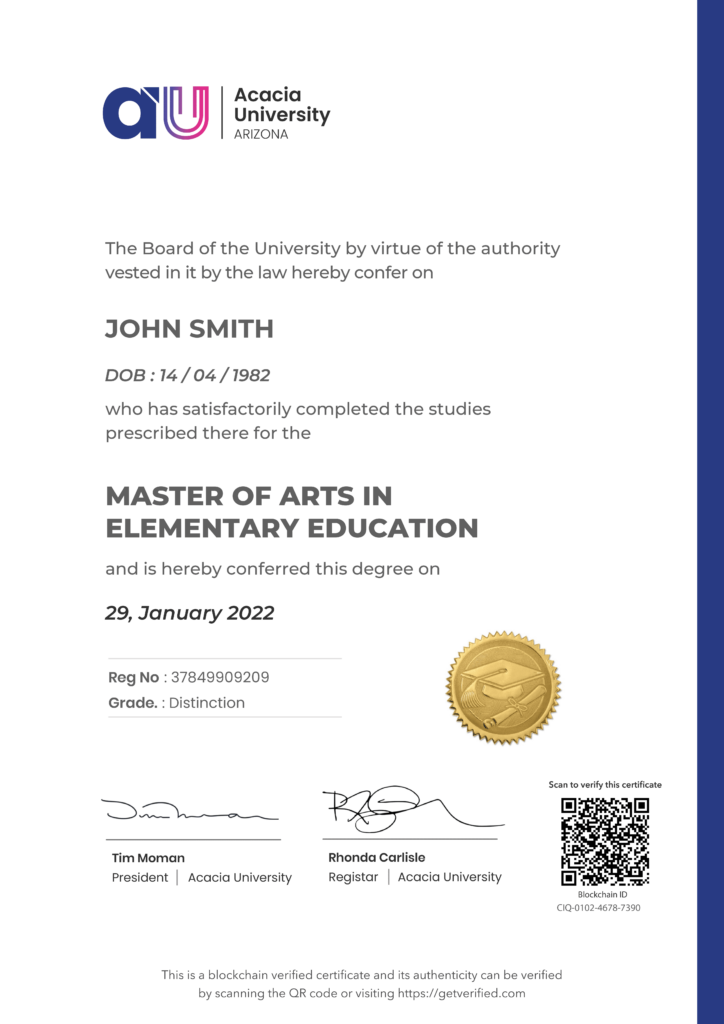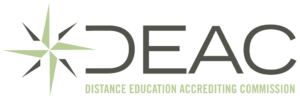Master of Arts in Elementary Education
The 24-month program is entirely customized through examples, strategies, and assignments for any elementary teacher to gain and sharpen instructional skills.
- Fast Track 1 Year
- Online Study Mode
- EMI Option
- European Accredited
- Dual Certification
The Master of Arts in Elementary Education program is a 36-credit K-8 program that offers a rich combination of online learning, classroom practice, learning community sharing, research and analysis, and assessment to produce teachers that are capable of making a difference in student learning and achievement. Online examples in each lesson are provided to help primary, intermediate and junior high school teachers in any subject or lesson. The program is entirely customized through the examples, strategies, and assignments for any elementary teacher to gain and sharpen instructional skills.
The courses that make up the program curriculum are designed to prepare and strengthen the classroom teacher by providing the most current research-based and proven educational strategies and knowledge. The curriculum encompasses learning theory, educational foundations, brain theory, best practices, curriculum development, standards, and assessment. The courses in child and adolescent development, special needs and classroom management provide a framework of how teachers can provide appropriate strategies and environments for all students. A mentored practicum and portfolio project are included to enable the student to synthesize the knowledge and skills of the program into his/her personal understanding of an effective classroom for elementary students.
The goal of the program is to develop scholar-practitioners who will learn and practice advanced skills in designing, implementing and analyzing instruction using research based strategies so they can provide an active, positive and effective classroom environment for elementary students.
Master’s Degree Admission Requirements
- Successful completion of a baccalaureate degree from an accredited college or university. The degree must be verified on an original transcript duly signed and certified by the Registrar or other responsible officer of the awarding institution directly to Acacia University. Mail or secure electronic delivery is accepted. Applicants submitting transcripts from non-US institutions may be required to have their transcript evaluated by a National Association of Credential Evaluation Services (NACES) member agency.
- English language competency – Applicants whose first language is not English and do not have a bachelor’s degree from a university in which instruction is conducted in English must provide evidence of English proficiency. The following are accepted exams and minimum scores required for admission:
- 60 on the paper-delivered Test of English as a Foreign Language (TOEFL PBT), or 71 on the Internet Based Test (iBT)
- 6.5 on the International English Language Test (IELTS)
- 50 on the Pearson Test of English Academic Score Report
- 100 on the Duolingo English Test
- 55 on the 4-skill Michigan English Test (MET)
- 650/LP on the Michigan Examination for the Certificate of Competency in English (ECCE)
- A minimum score on the College Board Accuplacer ESL Exam Series as follows:
- ESL Language Use: Score of 85
- ESL Listening: Score of 80
- ESL Reading: Score of 85
- ESL Sentence Meaning: Score of 90
- ESL Writeplacer: Score of 4
- Comprehensive Score for all exams of 350
- A minimum grade of Pre-1 on the Eiken English Proficiency Exam.
- A minimum B-2 English proficiency level identified within the Common European Framework of Reference (CEFR) standards and assessed through various ESOL examinations, including the University of Cambridge.
- For degrees in Education, applicants must demonstrate access to classrooms – confirmation of classroom and connectivity attestation through either a signed form https://www.acacia.edu/required-classroom-and-connectivity-attestation.pdf or declared via the Classroom and Connectivity Access Attestation section in the website admission form.
- The Master of Arts in Elementary Education requires access to elementary classrooms.
- The Master of Arts in Secondary Education requires access to secondary classrooms.
- The Master of Education in Educational Administration prefers a record of at least two years of successful teaching experience and requires access to classrooms.
- The Master of Education in Special Education requires access to Special Education classrooms for implementation of strategies and assignments.
- The Master of Education in English as a Second Language requires access to classrooms with ESL students.
- Ongoing access to computer technology – All Acacia University courses are presented online so each applicant must have a computer and internet access to participate.
Admission Eligibility and Requirements
- Successful completion of a baccalaureate degree from an accredited college or university – The degree must be verified on official transcripts sent by the awarding institution directly to Acacia University. Mail or secure electronic delivery is accepted.International applicants: Applicants submitting transcripts from non-US institutions must have their transcript evaluated by a National Association of Credential Evaluation Services (NACES) member agency. This requirement does not apply to international applicants who received a degree from a US college or university.
- English language competency – Applicants whose first language is not English and do not have a bachelor’s degree from a university in which instruction is conducted in English must provide evidence of English proficiency. The following are accepted exams and minimum scores required for admission:
- 60 on the paper-delivered Test of English as a Foreign Language (TOEFL PBT), or 71 on the Internet Based Test (iBT)
- 6.5 on the International English Language Test (IELTS)
- 50 on the Pearson Test of English Academic Score Report
- 100 on the Duolingo English Test
- 55 on the 4-skill Michigan English Test (MET)
- 650/LP on the Michigan Examination for the Certificate of Competency in English (ECCE)
- A minimum score on the College Board Accuplacer ESL Exam Series as follows:
ESL Language Use: Score of 85
ESL Listening: Score of 80
ESL Reading: Score of 85
ESL Sentence Meaning: Score of 90
ESL Writeplacer: Score of 4
Comprehensive Score for all exams of 350 - A minimum grade of Pre-1 on the Eiken English Proficiency Exam;
- A minimum B-2 English proficiency level identified within the Common European Framework of Reference (CEFR) standards and assessed through various ESOL examinations, including the University of Cambridge
- Teaching position or access to classrooms – confirmation of classroom and connectivity attestation through either a signed form https://www.acacia.edu/required-classroom-and-connectivity-attestation.pdf
or declared via the Classroom and Connectivity Access Attestation section in the website admission form.- The Master of Arts in Elementary Education requires access to elementary classrooms.
- The Master of Arts in Secondary Education requires access to secondary classrooms.
- The Master of Education in Educational Administration requires a minimum of 2 years of prior successful teaching experience and access to classrooms.
- The Master of Education in Special Education requires access to Special Education classrooms for implementation of strategies and assignments.
- The Master of Education in English as a Second Language requires access to classrooms with ESL students.
- Ongoing access to computer technology – All Acacia University courses are presented online so each applicant must have a computer and internet access to participate.
- Create elementary education instruction informed by research-based strategies integrated with the Power Strategies
- Consistently integrate the power strategies with other research-based strategies into their instruction
- Demonstrate comprehensive understanding and knowledge of the process and principles of curriculum design and assessment so they can plan effective instructional and assessment strategies
- Design and implement developmentally appropriate strategies that foster, nurture, and develop skills in students that are within, and outside of, the normal range of child development
- Design and implement strategies to meet the special educational needs of students in the classroom
- Collaborate with colleagues in meaningful ways about students and instructional strategies
- Analyze the national or state standards that are required and design instruction and instructional strategies that will enable students to meet the standards
- Communicate effectively with parents and other caregivers about the students’ successes, needs and areas of improvement
- Provide mentoring to other teachers as they implement effective strategies in the classroom
- Implement a coherent and effective secondary classroom utilising appropriate curriculum, instruction, and assessment practises
- Apply research and analysis skills to design and complete a project that would provide insight on an secondary education topic of their choice
- Create elementary education instruction informed by research-based strategies integrated with the Power Strategies
- Design elementary education curriculum, assessments, and resources to create a positive learning environment that supports and increases student achievement and develops skills in students according to their individual needs
- Analyze educational research, current trends, requirements, standards, and practices required to design instructional strategies in elementary education that enable students to meet learning goals and standards
- Develop instructional and classroom strategies that promote global citizenship, acceptance of others, and lifelong learning
- Communicate, verbally and in writing, effectively with parents and other caregivers about the students’ successes, needs, and areas of improvement
$138.88
Per Credit
Master of Arts in
Elementary Education
| COURSE NUMBER | COURSE TITLE | TOTAL COURSE CREDIT/CLOCK HOURS |
| EDC500 | Power Strategies for Effective Teaching | 3 |
| EDC510 | Power Strategies for Classroom Assessment | 3 |
| EDC520 | Power Strategies for Improving Comprehension | 3 |
| EDC540 | Classroom Management | 3 |
| EDC550 | Child and Adolescent Development | 3 |
| EDC560 | Curriculum, Instruction, and Assessment | 3 |
| EDC570 | Special Needs Students | 3 |
| EDC577 | English Language Learners | 3 |
| EDC585 | Principles of Elementary Education | 3 |
| EDC610-1 | Research Methods | 2 |
| EDC610-2 | Action Research | 3 |
| EDC620 | Mentored Practicum | 4 |
EDC500 Power Strategies for Effective Teaching
EDC510 Power Strategies for Classroom Assessment
EDC520 Power Strategies for Improving Comprehension
EDC540 Classroom Management
EDC550 Child and Adolescent Development
EDC560 Curriculum, Instruction, and Assessment
EDC570 Special Needs Students
EDC585 Principles of Elementary Education*
EDC610-1 Research Methods*
EDC610-2 Action Research*
EDC620 Mentored Practicum
EDC595 Principles of Secondary Education
EDC577 English Language Learners

Tuition
All master’s level courses are $138.88 per credit
Example
The cost for a single 3-credit graduate level course is $416.64
($138.88 x 3)
The total cost for a 36-credit master’s degree program is $5175
($138.88 x 36 + $75.00 one-time application fee + $100 graduation fee)
Fees
*Returning after 12-month or more absence

Most Acacia courses require no textbook. For those courses that do require a textbook, it is the responsibility of the student to purchase or rent the textbook prior to the start of the course. Acacia does not sell or lease textbooks. Students may purchase or rent in any format (hardback, e-textbook, new, used, etc.) but must use the assigned edition. Prices at the time of the current student handbook publication are listed here, but are subject to change. Prices listed are from the publisher, however, students may purchase from any source.
More Details
Tuition and fees are payable at the time of registration for each course. Students will not receive official grade reports, transcripts, or be awarded a degree until all financial obligations have been met. Students who have outstanding financial obligations to Acacia University will not be permitted to register for future courses unless special arrangements have been approved through the Finance Office.
Students may pay by check, money order, wire transfer, or credit card (Visa, MasterCard, American Express, and Discover). International students must pay with U.S. currency. Students whose employers will be invoiced for tuition shall submit a billing authorization form prior to the second week of class in lieu of course payment.
Military tuition assistance (TA) students may be eligible for a deferral of tuition once their DA 2171 Form has been completed, authorized, and received by Acacia University.
Veterans Affairs Educational Benefits
In accordance with Title 38 US Code 3679(e), Acacia University adopts the following additional provisions for any students using the U.S. Department of Veterans Affairs (VA) Post-9/11 G.I. Bill® (Ch. 33) or Vocational Rehabilitation & Employment (Ch. 31) benefits, while payment to the institution is pending from VA. Acacia University will not:
- Prevent the student’s enrollment;
- Assess a late penalty fee to the student;
- Require the student to secure alternative or additional funding;
- Deny the student access to any resources (access to classes, libraries, or other institutional resources) available to other students who have satisfied their tuition and fee bills to the institution.
However, to qualify for this provision, such students may be required to:
- Produce the VA Certificate of Eligibility (COE) by the first day of class;
- Provide a written request to be certified;
- Provide additional information needed to properly certify the enrollment as described in other institutional policies
GI Bill® is a registered trademark of the U.S. Department of Veterans Affairs (VA).
Acacia University offers graduate degrees for educators to achieve their professional goals. Completion of a degree program in itself does not constitute having a professional credential. Professional certifications and licenses are governed by boards empowered via State laws and/or professional organizations and commissions. Therefore, Acacia programs are NOT a pathway to teacher licensures in the US.
This information is provided per U.S. Federal Regulations, 34 CFR § 668.50 (2016 Rules), 34 CFR § 668.43 (2019 Rules), and in compliance with the State Authorization Reciprocity Agreement (SARA) Manual version 19.2.
Acacia University is an approved institution of the National Council for State Authorization Reciprocity Agreements (NC-SARA) which allows the university to provide distance learning programs and coursework to students located in states other than Arizona. NC-SARA approval does not grant reciprocity or exemption from state professional licensing requirements.






